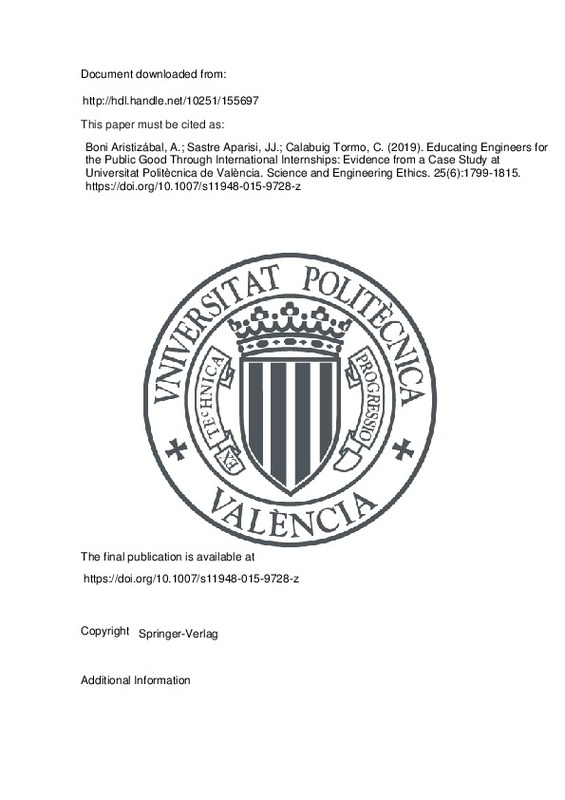Baillie, C., & Levine, M. (2013). Engineering ethics from a justice perspective: A critical repositioning of what it means to be an engineer. International Journal of Engineering, Social Justice and Peace,2(1), 10–20.
Boni, A., & Gasper, D. (2011). La Universidad como debiera ser. Propuestas desde el desarrollo humano para repensar la calidad de la Universidad. [The university as it might be. Contributions of a human development approach to rethinking quality of universities]. Sistema,220, 99–115.
Boni, A., & Gasper, D. (2012). Rethinking the quality of universities—How can human development thinking contribute? Journal of Human Development and Capabilities,13(3), 451–470.
[+]
Baillie, C., & Levine, M. (2013). Engineering ethics from a justice perspective: A critical repositioning of what it means to be an engineer. International Journal of Engineering, Social Justice and Peace,2(1), 10–20.
Boni, A., & Gasper, D. (2011). La Universidad como debiera ser. Propuestas desde el desarrollo humano para repensar la calidad de la Universidad. [The university as it might be. Contributions of a human development approach to rethinking quality of universities]. Sistema,220, 99–115.
Boni, A., & Gasper, D. (2012). Rethinking the quality of universities—How can human development thinking contribute? Journal of Human Development and Capabilities,13(3), 451–470.
Boni, A., MacDonald, P., & Peris, J. (2012). Cultivating engineers’ humanity: Fostering cosmopolitanism in a Technical University. International Journal of Educational Development,32(1), 179–186.
Boni, A., & Walker, M. (Eds.). (2013). Universities and human development. A new imaginary for the university of the XXI century. London: Routledge.
Bourn, D., & Neal, I. (2008). The global engineer: Incorporating global skills within UK higher education of engineers. London: Engineers Against Poverty and IOE.
Crosbie, V. (2013). Capabilities and a pedagogy for global identities. In A. Boni & M. Walker (Eds.), Universities and human development. A new imaginary for the university of the XXI century (pp. 178–191). London: Routledge.
Cruickshank, H., & Fenner, R. A. (2007). The evolving role of engineers: Toward sustainable development of the built environment. Journal of International Development,19(1), 111–121.
Gasper, D., & George, S. (2010). Cultivating humanity? Education and capabilities for a “Global Great Transition”. Working Paper 503. The Hague: Institute of Social Studies.
Greenwood, D., & Levin, M. (2007). Introduction to action research. Social research for social change. Thousand Oaks, CA, London: Sage.
Harris, C. E., Jr. (2008). The good engineer: Giving virtue its due in engineering ethics. Science and Engineering Ethics,14(2), 153–164.
Kabo, J. (2013). Editor’s introduction. International Journal of Engineering, Social Justice and Peace,2(1), 1–2.
Mitcham, C., & Englehardt, E. (2015). Ethics across the curriculum: Prospects for broader (and deeper) teaching and learning in research and engineering ethics. Science and Engineering Ethics, 22 (this issue).
Moskal, B. M., Skokan, C., Munoz, D., & Gosink, J. (2008). Humanitarian engineering: Global impacts and sustainability of a curricular effort. International Journal of Engineering Education,24(1), 162–174.
Nussbaum, M. (1997). Cultivating humanity: A classical defense of reform in liberal education. Cambridge MA: Harvard University Press.
Nussbaum, M. (2000). Women and human development: The capabilities approach. Cambridge: Cambridge University Press.
Nussbaum, M. (2006). Education and democratic citizenship: Capabilities and quality education. Journal of Human Development,7(3), 385–395.
Passino, K. M. (2009). Educating the Humanitarian Engineer. Science and Engineering Ethics,15(4), 577–600.
Penz, P., Drydyk, J., & Bose, P. (2010). Displacement by development. Ethics, rights and responsibilities. Cambridge: Cambridge University Press.
Rawls, J. (1971). A theory of justice. Cambridge: Harvard University Press.
Robbins, P. T. (2007). The reflexive engineer: Perceptions of integrated development. Journal of International Development,19(1), 99–110.
Sen, A. (1999). Development as freedom. New York: Knopf.
Sheppard, S. D., Macatangay, K., Colby, A., & Sullivan, W. M. (2008). Educating engineers. Designing for the future of the field. San Francisco: Jossey-Bass and The Carnegie Foundation.
United Nations Development Programme. (2014). Human development report. New York: United Nations Development Programme.
Walker, M. (2006). Higher education pedagogies. Berkshire, NY: Society for Research into Higher Education and Open University Press.
Walker, M., & McLean, M. (2013). The global engineer professional education, capabilities and the public good. London: Routledge.
[-]







![[Cerrado]](/themes/UPV/images/candado.png)


